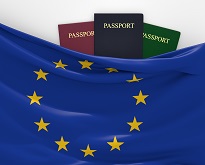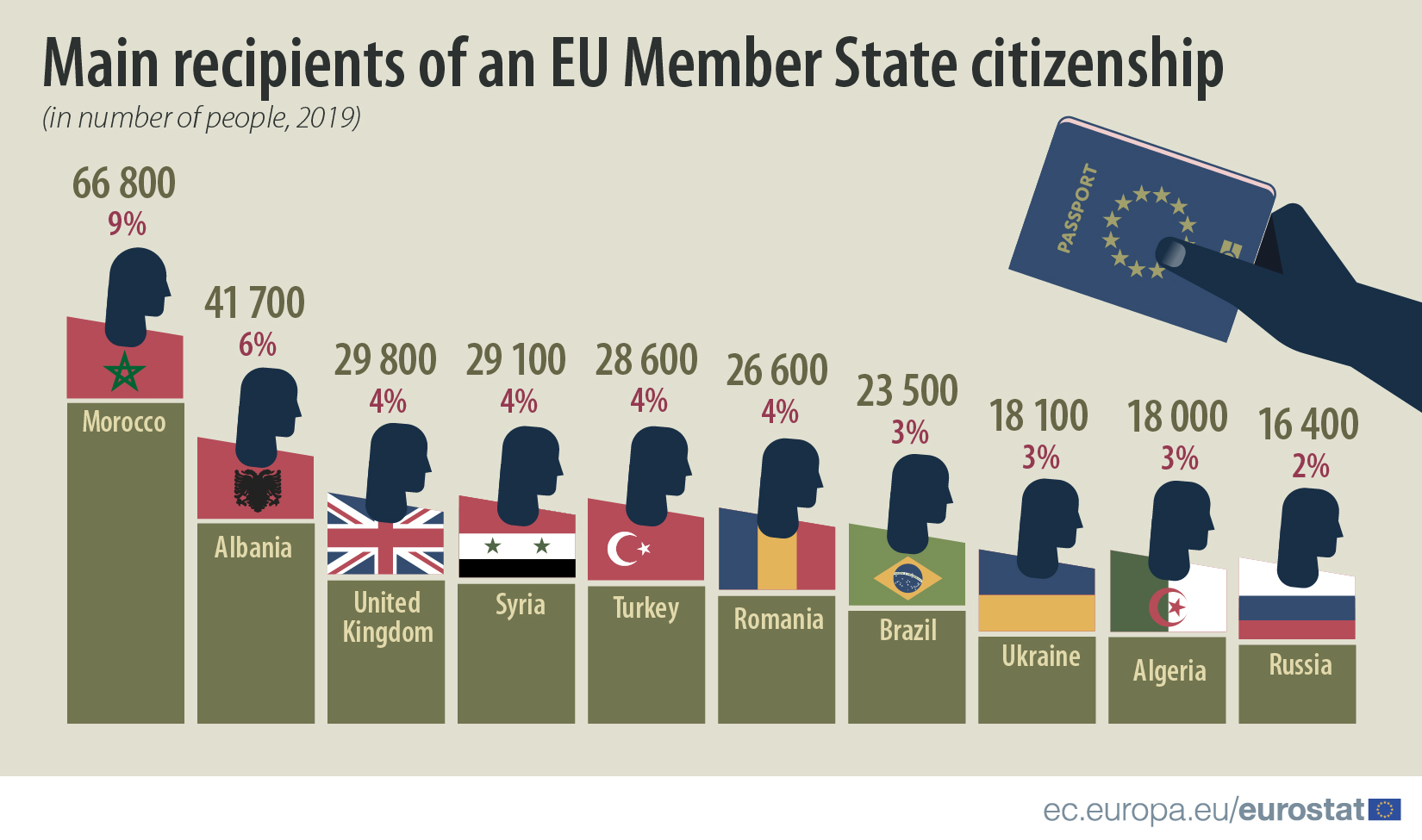In 2019, around 706 400 persons acquired citizenship of an EU Member State where they lived, up from 672 300 in 2018 and 700 600 in 2017. The majority of those who obtained the citizenship of an EU Member State in 2019 were previously citizens of a non-EU country or stateless, while former citizens of another EU Member State accounted for 13% of the total number of citizenships acquired.
This information comes from data on acquisition and loss of citizenship published by Eurostat today.
Moroccans, Albanians and Britons were the main recipients
In 2019, Moroccans were the largest group among new EU-citizens (66 800 persons, of whom 84% acquired citizenship of Spain, Italy or France), ahead of Albanians (41 700, 62% acquired citizenship of Italy), Britons (29 800, 75% acquired citizenship of Germany, Sweden or France), Syrians (29 100, 69% acquired citizenship of Sweden), Turks (28 600, 57% acquired German citizenship), Romanians (26 600, 60% acquired citizenship of Italy or Germany), Brazilians (23 500, 73% acquired citizenship of Italy or Portugal), Ukrainians (18 100, 59% acquired citizenship of Germany, Poland or Italy), Algerians (18 000, 82% acquired French citizenship) and Russians (16 400, 31% acquired German citizenship). Compared to 2018, Moroccans and Albanians remained the main recipients, while Britons moved from seventh to third place.
Romanians (26 600 persons), Poles (12 600) and Italians (8 700) remained the three largest groups of EU citizens acquiring citizenship of another EU Member State, the same as in 2018.
Most new citizenships were granted by Germany (132 000 or 19% of the EU total), Italy (127 000 or 18%), France (109 800 or 16%), Spain (99 000 or 14%) and Sweden (64 200 or 9%) accounting for 75% of new citizenships granted in the EU in 2019.
Source dataset: migr_acqs
Highest naturalisation rate in Sweden
The naturalisation rate is the ratio of the number of persons who acquired the citizenship of a country during a year over the stock of foreign residents in the same country at the beginning of the year. In 2019, the highest naturalisation rates were registered in Sweden (7.0 citizenships granted per 100 resident foreigners), Romania (4.7) and Portugal (4.4), followed by Finland (3.8), the Netherlands (3.2) and Belgium (2.9).
At the opposite end of the scale, naturalisation rates below 1 citizenship acquisition per 100 resident foreigners were recorded in Lithuania (0.2), Denmark (0.3), Estonia (0.4), Czechia (0.5), Latvia (0.6), Austria (0.7), Bulgaria and Slovakia (0.8 each) as well as Malta and Ireland (0.9 each).
Source dataset: migr_acqs
For more information:
- Citizenship is the legal bond between an individual and a state, acquired by birth, naturalisation or other means according to national legislation. Naturalisation is the process by which a state grants its citizenship through a formal act on the application of the individual concerned. Other ways of granting citizenship may include spouses of nationals, minors adopted by nationals and descendants of nationals born abroad returning to the country of origin of their ancestors.
- The naturalisation rate is the ratio of the number of persons who acquired the citizenship of a country during a calendar year over the stock of foreign residents in the same country at the beginning of the year. The 'naturalisation rate' should be used with caution because the numerator includes all modes of acquisitions and not just naturalisations of eligible residing foreigners and the denominator includes all foreigners and not the relevant population, i.e. those foreigners who are eligible for naturalisation.
- Eurostat Statistics Explained article on acquisition of citizenship statistics
- Eurostat database on migration and citizenship
- Eurostat interactive infographic on acquisition of citizenship in the EU
To contact us, please visit our User Support page.
For press queries, please contact our Media Support.



